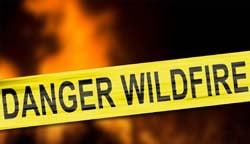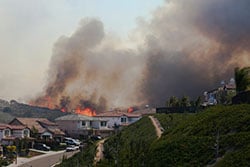- By Marketing
- In Mold Removal
Protect Yourself from Wildfire Smoke

Dry conditions in much of the United States increase the potential for wildfires in or near wilderness areas. Stay alert for wildfire warnings and take action to protect yourself and your family from wildfire smoke.
When wildfires burn in your area, they produce smoke that may reach your community. Wildfire smoke is a mixture of gases and fine particles from burning trees and other plant materials. This smoke can hurt your eyes, irritate your respiratory system, and worsen chronic heart and lung diseases.
Who is at greatest risk from wildfire smoke?
- People who have heart or lung diseases, like heart disease, chest pain, lung disease, or asthma, are at higher risk from wildfire smoke.
- Older adults are more likely to be affected by smoke. This may be due to their increased risk of heart and lung diseases.
- Children are more likely to be affected by health threats from smoke. Children’s airways are still developing and they breathe more air per pound of body weight than adults. Also, children often spend more time outdoors engaged in activity and play.
 Stay alert for wildfire warnings.
Stay alert for wildfire warnings. Take precautions to decrease risk from wildfire smoke.
Take precautions to decrease risk from wildfire smoke.Take steps to decrease your risk from wildfire smoke.
- Check local air quality reports. Listen and watch for news or health warnings about smoke. Find out if your community provides reports about the U.S. Environmental Protection Agency’s Air Quality Index (AQI) or check the report on AirNow.gov. In addition, pay attention to public health messages about safety measures.
- Consult local visibility guides. Some communities have monitors that measure the amount of particles in the air. In the western United States, some states and communities have guidelines to help people determine if there are high levels of particulates in the air by how far they can see.
- Keep indoor air as clean as possible if you are advised to stay indoors. Keep windows and doors closed. Run an air conditioner, but keep the fresh-air intake closed and the filter clean to prevent outdoor smoke from getting inside. If you do not have an air conditioner and it is too warm to stay inside with the windows closed, seek shelter in a designated evacuation center or away from the affected area. Learn more about reducing your smoke exposure indoors.[819 KB]
- Avoid activities that increase indoor pollution. Burning candles, fireplaces, or gas stoves can increase indoor pollution. Vacuuming stirs up particles already inside your home, contributing to indoor pollution. Smoking also puts even more pollution into the air.
- Prevent wildfires from starting. Prepare, build, maintain and extinguish campfires safely. Follow local regulations if you burn trash or debris. Check with your local fire department to be sure the weather is safe enough for burning.
- Follow the advice of your doctor or other healthcare provider about medicines and about your respiratory management plan if you have asthma or another lung disease. Consider evacuating if you are having trouble breathing. Call your doctor for advice if your symptoms worsen.
- Do not rely on dust masks for protection. Paper “comfort” or “dust” masks commonly found at hardware stores are designed to trap large particles, such as sawdust. These masks will not protect your lungs from the small particles found in wildfire smoke. Read more on choosing and using respirators to protect your lungs from smoke and ash.[321 KB]
- Evacuate from the path of wildfires. Listen to the news to learn about current evacuation orders. Follow the instructions of local officials about when and where to evacuate. Take only essential items with you. Follow designated evacuation routes–others may be blocked–and plan for heavy traffic.
- Protect yourself cleaning up after a fire. Cleanup work can expose you to ash and other products of the fire that may irritate your eyes, nose, or skin and cause coughing and other health effects. Learn how to protect yourself from ash.[845 KB]
